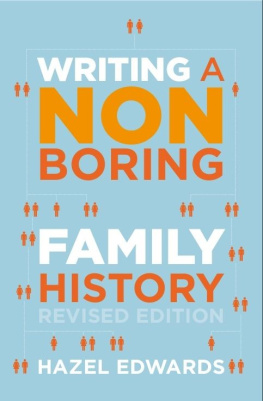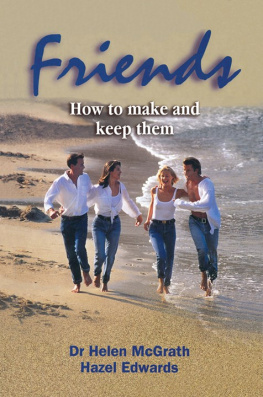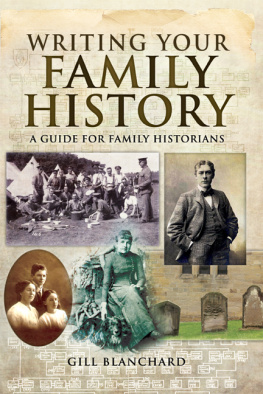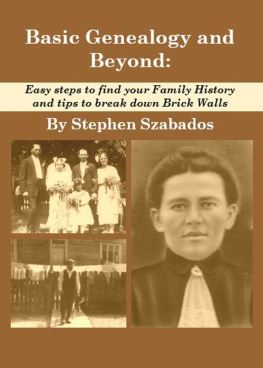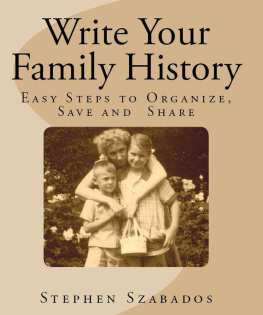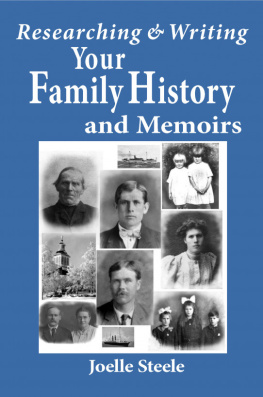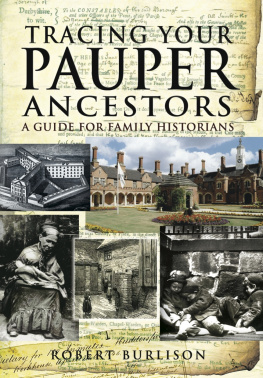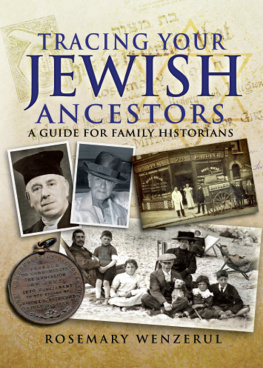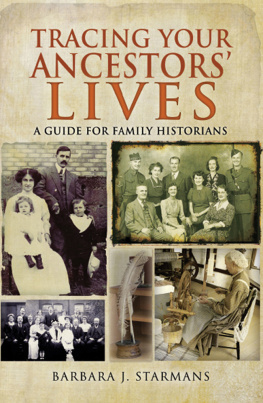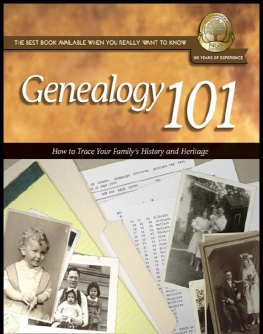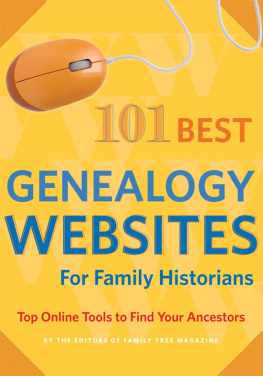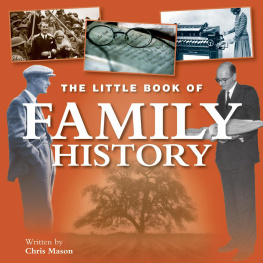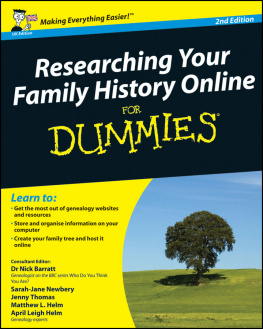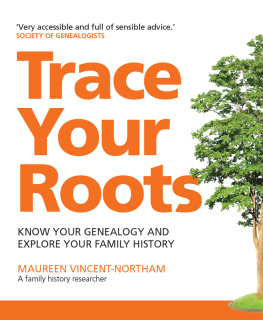Writing a Non-Boring Family History
Hazel Edwards Writing Non-fiction workshops were swamped with family historians, so she began to run specialised sessions. Avid historians now book out her How to Write Non-Boring Family Histories seminars. Her workshops concentrate on how to shape and write a book that other people will want to read. The approach in this book is a result of advice offered in workshops and private consultancies held Australia-wide.
Hazel has written over 200 books for adults and children. She is best known for her childrens classic Theres a Hippopotamus on Our Roof Eating Cake. Antarctic Writer on Ice was researched in Antarctica while Hazel was the recipient of the 2001 ANARE (Australian National Antarctic Research Expedition) berth. In 2009 Hazel was awarded the ASA Medal by her writing peers, and she has been nominated for the 2011 Astrid Lindgren Award. Her website www.hazeledwards.com has details of other writing projects and talks.
This revised edition published 2011
First published in Australia in 1997 by Hale & Iremonger
an imprint of The GHR Press
Level 8, 182-186 Blues Point Road
McMahons Point NSW 2060
www.ghrpress.com
Copyright Hazel Edwards 2011
The moral right of the author has been asserted. This work is copyright. Apart from any fair dealing for the purposes of private study, research, criticism or review as permitted under the Copyright Act 1968, no part of this book may be reproduced, copied, scanned, stored in a retrieval system, recorded, or transmitted, in any form or by any means, without prior written permission from the publisher.
National Library of Australia Cataloguing-in-Publication data:
Edwards, Hazel, 1945 Writing a non-boring family history / by Hazel Edwards. Revised ed. ISBN: 978-0-9871078-5-5 (pbk.) Genealogy Authorship. Australia Genealogy.
808.0669291
Cover design by Xou Creative Internal design by Kirby Jones
Contents
Recipe for writing a non-boring family history
Ingredients
1 cup of self-raising imagination
Dates
Thyme (endless spoonfuls)
Researchitus, diluted
Sprinkle of ancestral curiosity
Pinch of opportunity
Flakes of serendipity
Zest of reader-researcher
litre of language, including mixed fruit of adjectives (used moderately)
half-a-dozen embryonic ideas (egg-shaped)
Slurp of suspense, secrecy or drama
Dash of inspiration
Intriguing title, cover and blurb
Method
Drizzle inspiration on all pages. Mix all data and especially dry ingredients in computerised container. Keep for an appropriate time. Heat emotions or ice over disputes. For special occasions, decorate and display at reunion, anniversary or family gathering.
Result
Historical readaholic or relative indigestion due to overmuch hot air.
Introduction
Many family historians do not originally set out to write a book. Initially they enjoyed collecting family letters, facts and memorabilia and then became interested in preserving their familys past in a tangible way.
Some do not have a deadline for completing their history, for them its a lifelong hobby. Others find that they are increasingly being asked, When are you going to write a book about your family?
Writing a Non-Boring Family History is a practical guide for those who need some help in shaping their history in a way others might choose to read, rather than just compiling lists of births, marriages, shipping lists and deaths.
Most family historians have not tackled a book-length project before. And because most historians are looking for why things happened, there is a personal satisfaction in assembling the answer in a format others will want to read.
Some historians are interested only in assembling facts before the owners of those facts vanish, but there are techniques which can make such compilations more readable. Other authors are interested in ensuring that their books, which have taken so many years to research and write, are not just given cursory glances and shelved, forever.
Writing a Non-Boring Family History offers a practical approach to organising your historical research in a way that others will wish to read and recommend.
Generic questionnaire
Here are some important questions to ask before starting your historic project:
Why am I doing this?
Is there a deadline? When is it? (An anniversary? A reunion? Celebration?)
What resources are already available to me?
Who is likely to help? In what ways?
Who is my prospective reader? Will the public be interested too?
What will be the scope of the history? How will I set the limits?
Am I a self-employed writer or is the family my client?
Do I need a written brief or agreement on the scope and purpose of the history as an insurance for myself?
Is it to be self-published or commercially published?
What is my budget?
Am I to be paid a fee, expenses, or is it a family freebie?
What will be the size of the initial print run? (How many copies planned?)
Will there be an e-book?
Where and how will I store the data and backups?
What is the working title of the book? Will it need a subtitle too?
Will I need to travel to get information or interview people?
Will my interview schedule allow for the elderly or ill to be done first?
Will any overseas research be necessary? How and when can I fit this in?
Should I start writing before I finish researching?
Is it possible to have a reunion at least a year before the deadline so relatives will bring data to a central point?
Could I use some of the facts for a eulogy?
Who will edit the book?
Who will design the layout?
What will the cover look like?
How many pages? What print (font) size? How many words is that?
How do I organise copies of old photos or letters? Should all be included?
Should it be a book, digital photo album, e-book, audio, CD or family history with online links?
Is anyone likely to be offended by the content?
What if I dont meet the deadline?
How do I make it non-boring?
I Pre-history
1 Why are you writing this history?
Although it can be a fascinating journey of self-discovery, writing a family history is a big job. Its wise to be clear in your own mind why you have undertaken this project.
Which of these reasons is closest to yours?
Something youve always wanted to do?
Older relatives or locals have died recently and youre conscious that family or local information is dying with them?
You enjoy the research?
Suddenly there is time available for a big project?
Youve inherited all the bits of information, photos and letters?
A significant reunion or anniversary is approaching?
People keep asking, When are you going to write your family history book?
Some other reason?
The public reason you give to others for writing this history may not necessarily be the private reason that you also hold.
Recently my mother died and I suddenly realised at the funeral that I was now the older generation and my children did not know about the world in which she had lived as a child. With two marriages behind me, my family tree was complicated. Unless I tried to sort out some of the documents and photos left in the household, no-one else would know about the courage of some of the earlier members of our family, including my mother. I needed to sort out my own relative position and work out mentally where I fitted and what characteristics I might have inherited.
Next page
